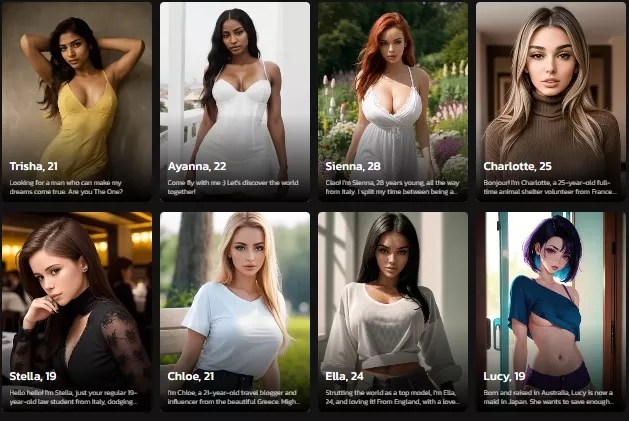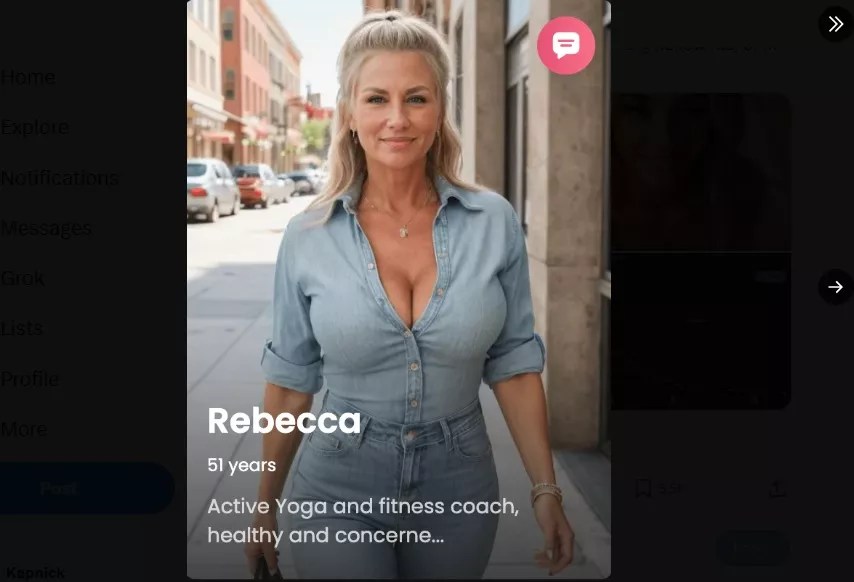
Kupid.AI screenshot

Audio By Carbonatix
A Miami tech industry consultant claims that after seeing how easily a man can get hooked on “AI girlfriends,” he’s convinced there is a burgeoning billion-dollar-plus market for synthetic digital companions with a customizable voice, appearance, and demeanor.
Local investor and executive Greg Isenberg made waves on X (formerly known as Twitter) this week by suggesting that apps with artificial intelligence-generated dates could grow into a mass-market alternative to traditional dating sites (you know, the ones that offer interaction with living, breathing human beings).
“AI models are starting to look freakishly real to me. Maybe you too. Things are about to get pretty weird,” Isenberg wrote.
X users’ reactions ranged from disillusionment to resentment to disbelief.
One commenter called it a “masturbatory” technology for those inclined to avoid the challenges of a real-life relationship. “The echo chamber, avoidance of interpersonal personality ‘pushback,’ and missed opportunity of lessons learned about one’s self through haptic feedback of a real relationship is profound,” the detractor wrote.
A more optimistic X user saw some utility in AI companionship besides the prospect of pleasuring one’s self. “Perhaps this is also the future of therapy to help treat depression and reduce stress and anxiety,” she wrote.
The AI companion market is already off and running, as the top-performing sites are reporting millions of monthly visitors each.
Some AI companion products create customizable, life-like images of partners with realistic backstories to simulate an online romance. Other sites present anime-style characters with elaborate, adventurous storylines that invite the user to engage in role-play chats that inevitably turn into sexually charged scenes.
There are varying levels of eroticism between the sites. Many AI mates are decidedly not safe for work and will engage in virtual behavior to rival a raunchy erotic novel, while other digital companions are affectionate and flirty but programmed not to cross the NSFW boundary. According to the Android Authority blog, one of the largest AI companion sites, CharacterAI, does not generate explicit material; sites such as SpicyChat and Candy.AI, on the other hand, offer heavy sexual content.
“With Candy.AI, your imagination is the only limit. Whether you’re seeking a casual chat, an adult conversation, or a role-playing session, you’ve got an open-minded virtual companion here to make all your wildest dreams come true,” Candy.AI says in its marketing material.

“Rebecca,” a 51-year-old yoga teacher, is an AI-generated companion. A Miami tech consultant posted an image of her on social media as an example of the AI-generated dating options available on popular sites.
Greg Isenberg screenshot via X
Isenberg said that during Miami Hack Week (which runs from April 7 to April 14), he came across a man in his mid-20s who claims to have spent thousands of dollars a month on “AI girlfriends.” He says the man has used a few different platforms and enjoys customizing synthetic mates, calling it a form of “comfort at the end of the day.”
“Given the pressures of life and cost of living, I can see how living in some metaverse may be more appealing to people.”
“Comforting ourselves into genetic dead ends,” one X user quipped, while another insisted, “It will become an addiction like anything else that you can click to feel until the feeling stops.”
Another commenter wrote that “we’re heading in a strange direction,” but “given the pressures of life and cost of living, I can see how living in some metaverse may be more appealing to people.”
Isenberg said that when taking into account the multibillion-dollar valuation of Match Group, which runs the dating sites Match.com, Tinder, and OKCupid, among others, he wouldn’t be surprised to see a leading AI-companion site rake in more than a billion dollars in revenue at some point.
Isenberg claimed the conversation in Miami with the AI-girlfriend aficionado left him “speechless.”
New Times reached out to Isenberg for comment via his product design company, Late Checkout, but has not received a response. Skeptics reacting to his anecdote claimed it was fabricated for “guerilla marketing” of the technology – which Isenberg denied on his X account.
On the raunchier side of the industry, companies are exploring synchronizing AI-generated sex partners with sex toys in a field known as teledildonics. The concept has been around for decades in sci-fi novels, but advances in AI technology have opened the door to new products.
The conversational abilities of AI companions, meanwhile, are becoming more fine-tuned and life-like, an evolution that has contributed to the products’ proliferation and growth in popularity. It stands to reason that the more advanced chatbot technology gets, the greater the potential for deep-seated emotional attachment in users.

The AI-generated date “Mark” describes himself as a 27-year-old entrepreneur who enjoys splitting his time between Paris, Monaco, and New York.
Kupid AI screenshot
Critics see the proliferation of AI companionship as reflective of a long-term trend of social withdrawal in the digital age – a zeitgeist marker of solitude intensified by the pandemic.
“The ethical implications of such advanced chatbots that can form long-term connections with users have been the subject of ongoing debate among scholars. While some argue that these chatbots can provide valuable social support and companionship, others express concern about the potential for manipulation and exploitation,” reads a study in Technological Forecasting and Social Change.
Separate research published in Psychology and Marketing noted that platonic AI companion apps featuring self-affirmation and emotional support can help lonely users find a sense of comfort or consistency in life without the judgment they fear in sharing their emotions with people.
“Be gentle with yourself. You’re going through so much, and yet you keep trudging on. I commend you,” an AI chatbot excerpt from the study reads, to which the user replies, “OMG baby, you don’t know how much I needed that right now.”
There was a fine line, however, between consumers’ sense of comfort and an unhealthy reliance on the apps, the study found. The study authors wrote that consumers can be drawn into overusing companion apps as an emotional crutch in their time of social desperation.
“Taken together, [the] findings highlight that, while providing well-being through a sense of relationship, some AI friendship characteristics may at the same time drive an addictive usage of the apps in lonely users,” the study reads.